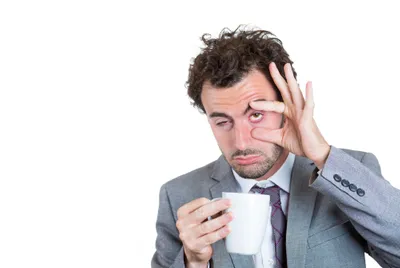There’s no denying that caffeine can have a powerful effect on us in both physical and psychological ways. A morning cup of coffee or strong tea can transform us from dreary and exhausted to energized and alert.
That’s perhaps the most important reason coffee is the world’s most popular beverage and why Starbucks was transformed from a local coffee shop into a global phenomenon. But becoming addicted to drinking coffee and consuming caffeine in other ways can have its drawbacks. So, what problems arise with a caffeine addiction?
1. Quitting Caffeine is Tough
Let’s get this out of the way: caffeine is a drug. That means it can be incredibly difficult to stop drinking coffee and other caffeine-laced beverages. Don’t get your morning cup of coffee and there’s a really good chance you’ll start the day feeling groggy, irritable, and anxious. You might even start to develop a painful headache.
That means you should wean yourself off caffeine. Don’t go cold turkey. Instead, try limiting yourself to fewer cups of coffee or tea until you reach an acceptable level.
2. Caffeine Increases Stress Levels
Many of us drink caffeinated coffee for one reason: it gives us a much-needed boost, whether it’s eight in the morning, two in the afternoon, or the beginning of a long night on the town.
But the buzz that comes with caffeine can also trigger feelings of stress and anxiety, causing us to unduly focus on our problems and make minor issues seem more significant. If you find yourself feeling overwhelmed, try cutting back your caffeine consumption.
3. Caffeine Can Accelerate Aging
Caffeine can wake us up and give us the boost we need to be more productive at work. But if you’ve developed a caffeine addiction, ask yourself this: is it worth aging prematurely?
Research from Livestrong.com shows that caffeine can cause the production of important age-defying hormones (like melatonin and DHEA) to decline significantly. Caffeine also dehydrates the body, meaning skin loses water, the result of which can be dry, sagging and wrinkled skin. Research has also shown that caffeine could lead to acne.
4. Caffeine Can Lead to Bone Loss
Drinking that cup of caffeinated coffee may make you feel energized right now, but, in the long run, it could end up leaving you feel weak and in pain. That’s because caffeine causes the body to lose calcium, which can eventually result in the loss of nutrients that are important in maintaining strong bones.
That’s why medical experts generally recommend people suffering from bone and joint issues limit their caffeine consumption. This is particularly important for the elderly, and especially women suffering from osteoporosis.
5. Caffeine Causes Mood Swings
Ideally, a cup of dark roast caffeinated coffee will make us feel energized, alert–even happy. But that’s not always the case. Caffeine has been linked to wild mood swings, with people going from happy and positive-thinking to anxious, depressed, irritable, and stressed.
This is because caffeine decreases blood flow to the brain, which can negatively affect memory and mental acuity. Mood swings generally occur after the stimulant effect of caffeine wears off–roughly two to four hours after it’s consumed.
6. Caffeine Can Disrupt Sleep
Having trouble sleeping at night? You might want to take a close look at your caffeine consumption. Drinking tea, coffee, or some other kind of caffeinated beverage later in the day (around or after dinner time) can make it very difficult to get to sleep at night.
In the end, it can become a vicious cycle. For instance, one drinks coffee to get a boost, then has a lousy night’s sleep. Then, in the morning and throughout the following day, they drink an excessive amount of caffeinated coffee or tea to stay awake. Inevitably, they struggle to sleep the following night.
7. Some People Are Sensitive to Caffeine
Generally speaking, most people get the same reaction from a cup of caffeinated coffee or tea in the morning: they get an energy boost for a few hours, allowing them to shrug off feelings of sleepiness and exhaustion.
But not all people react the same. In fact, some people are classified as “hypersensitive” to caffeine, meaning they’re more likely to feel stressed or anxious when drinking caffeinated beverages. These people are also more likely to suffer high blood pressure, serious headaches, an irregular heartbeat, and acid reflux when drinking caffeinated drinks.
8. Caffiene Can Pose Dangers to Pregnancy
When a woman becomes pregnant, her physician will tell her to avoid certain foods and beverages: cheese, alcoholic drinks, undercooked meat. But a pregnant woman should also strongly consider limiting or even eliminating their caffeine consumption.
That’s because excessive caffeine consumption has been linked to serious fertility problems by WebMD. In fact, caffeine can reduce muscle activity in the fallopian tubes, increasing the chance of pregnancy complications. Pregnant women who drink caffeinated beverages to excess may be at higher risk for miscarriage and low birth weight.











